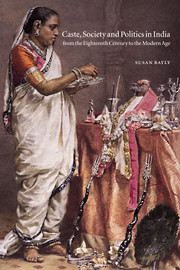Book contents
- Frontmatter
- Introduction
- 1 Historical origins of a ‘caste society’
- 2 The ‘Brahman Raj’: kings and service people c. 1700–1830
- 3 Western ‘orientalists’ and the colonial perception of caste
- 4 Caste and the modern nation: incubus or essence?
- 5 The everyday experience of caste in colonial India
- 6 Caste debate and the emergence of Gandhian nationalism
- 7 State policy and ‘reservations’: the politicisation of caste-based social welfare schemes
- 8 Caste in the everyday life of independent India
- 9 ‘Caste wars’ and the mandate of violence
- Glossary
- Bibliography
- Index
- Map 1 The break-up of the Mughal empire and the emergence of the successor states, c. 1766"
- References
7 - State policy and ‘reservations’: the politicisation of caste-based social welfare schemes
Published online by Cambridge University Press: 28 March 2008
- Frontmatter
- Introduction
- 1 Historical origins of a ‘caste society’
- 2 The ‘Brahman Raj’: kings and service people c. 1700–1830
- 3 Western ‘orientalists’ and the colonial perception of caste
- 4 Caste and the modern nation: incubus or essence?
- 5 The everyday experience of caste in colonial India
- 6 Caste debate and the emergence of Gandhian nationalism
- 7 State policy and ‘reservations’: the politicisation of caste-based social welfare schemes
- 8 Caste in the everyday life of independent India
- 9 ‘Caste wars’ and the mandate of violence
- Glossary
- Bibliography
- Index
- Map 1 The break-up of the Mughal empire and the emergence of the successor states, c. 1766"
- References
Summary
INTRODUCTION
By the time the new Republic's ‘secular’ Constitution was being drafted, the claims of caste were active though not necessarily decisive elements in the domains of work, worship and politics. Both before and during the colonial period, this shift towards a predominantly castelike social order occurred through the economic and political changes which were described in previous chapters. New trends in ideology were also important here, particularly the initiatives of nationalists and social reformers, as well as the writings of Western orientalists.
Having concentrated in Chapter 6 on the role of the pre-Independence electoral arena, this chapter explores the moves made by jurists, politicians and government agencies in the decades after 1947. For most of this period, the Republic's official institutions were directed to use their powers in inherently contradictory ways. On the one hand, they were to promote the making of a ‘modern’ casteless India. Yet simultaneously, they were to accept the reality of caste in fulfilling the state's other key modernising goal, that of relieving so-called ‘disability’ by improving the lot of the ‘depressed’.
This chapter therefore has a dual focus. First, it will discuss the provisions of the 1950 Constitution in regard to low-caste ‘uplift’. Secondly, it attempts to interpret the battles over caste-based regional welfare schemes (‘reservations’) which have been an explosive feature of Indian politics in the years since Independence. The emphasis here will be on government and party politics in the forty-year period when the public sector commanded a high proportion of the country's resources, when the state was still a major employer, and when state agencies still retained the massive regulatory powers with which they had been vested after Independence.
Keywords
- Type
- Chapter
- Information
- Publisher: Cambridge University PressPrint publication year: 1999
References
- 1
- Cited by



